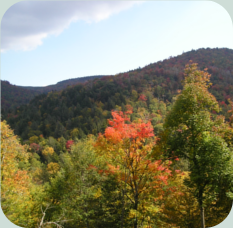Fall 2011
Table of Contents - Vol. VII, No. 3
Poetry Fiction Translations Reviews
Karel Hynek Mácha
The following verses come from "May"-- "Máj" in Czech (Twisted Spoon Press, 2005 & 2010 bilingual edition). Included here is the opening part of the first canto. "Máj" is the first book-length poem written in the Czech language. It portrays a young woman pining for her lover condemned to death, his last hours and execution, nature's lament for him, and the poet's recollection of the lovers' legend. The reason for the poem's popularity and longevity is the beautify of its music and its innovative use of language. Nearly every Czech can recite the poem's opening lines.
I
It was late evening—first of May—
was evening May—the time for love.
The turtledove invited love
to where the pine grove’s fragrance lay.
The silent moss murmured of love,
the flowering tree belied love’s woe.
The nightingale sang rose-filled love,
the rose exhaled a sweet complaint.
The placid lake in shadowed thicket
resounded darkly secret pain,
embracing it within its shores;
the pristine suns of other worlds
were wandering through the sky’s blue band,
as fiery as a lover’s tears.
The worlds rose in the sky as if
into the shrine of lasting love
till—passion burned itself away,
diminishing to sparks, it died—
wandering, these lovers joined as one.
The lovely face of the full moon—
so palely light, so lightly pale,
like one, beloved, seeks her love-
enflamed into a rosy flush
because she’d seen her watery face,
and she was dying of love for herself.
The far white cottages’ images glowed
and drew together, closer, close,
as if embracing, lower, low,
then flowed into the sunset’s womb,
there finally merging in the twilight into one.
With them, the trees converged with trees.—
Behind, the mountains cast their gloom,
where birch to pine and pine to birch
inclined. And wave pursing wave
rushed through the stream. Yes, every being—
in love’s time—overflowed with love.
Beneath an oak this rosy eve
a comely girl is sitting. From
a rock above the shore, across
the lake she gazes.
Here blue is winding to her legs,
it flowers further into green,
and ever greener, till it flows
and merges into pallid light.
Across the vastness of the lake
her anxious, weary eyes are fixed;
across the vastness of the lake
only stars reflect their light.
Such a lovely, fallen angel,
amaranth of barren spring,
the sleeping beauty of her face.
This hour has stolen everything,
and marked her forehead, eyes and mouth
with sadness and a charming grief.—
Today, the twentieth, subsided
like dreams crossing the countryside.
The final blaze of sunset goes,
and then the sky, grown lately rose,
falters over far blue hills.
“He isn’t coming!-He won’t return!—"
The girl, betrayed, is torn by grief!
A deep sigh rises on her chest,
her heart is throbbing painfully,
and in the waters strange, soft moans
are mixing with her tears and grief.
The starlight preens itself in tears
that flow across her cheeks like sparks;
the sparks are hot, her cheeks are cold.
They die, like falling stars,
and where they fall, the flowers fold.
© Marcela Sulak
Máj
I
Byl pozdní večer – první máj –
večerní máj – byl lásky čas.
Hrdliččin zval ku lásce hlas,
kde borový zaváněl háj.
O lásce šeptal tichý mech;
květoucí strom lhal lásky žel,
svou lásku slavík růži pěl,
růžinu jevil vonný vzdech.
Jezero hladké v křovích stinných
zvučelo temně tajný bol,
břeh je objímal kol a kol;
a slunce jasná světů jiných
bloudila blankytnými pásky,
planoucí tam co slzy lásky.
I světy jich v oblohu skvoucí
co ve chrám věčné lásky vzešly;
až se – milostí k sobě vroucí
změnivše se v jiskry hasnoucí –
bloudící co milenci sešly.
Ouplné lůny krásná tvář –
tak bledě jasná, jasně bledá,
jak milence milenka hledá –
ve růžovou vzplanula zář;
na vodách obrazy své zřela
a sama k sobě láskou mřela.
Dál blyštil bledý dvorů stín,
jenž k sobě šly vzdy blíž a blíž,
jak v objetí by níž a níž
se vinuly v soumraku klín,
až posléze šerem v jedno splynou.
S nimi se stromy k stromům vinou. –
Nejzáze stíní šero hor,
tam bříza k boru, k bříze bor
se kloní. Vlna za vlnou
potokem spěchá. Vře plnou –
v čas lásky – láskou každý tvor.
Za růžového večera
pod dubem sličná děva sedí,
se skály v břehu jezera
daleko přes jezero hledí.
To se jí modro k nohoum vine,
dále zeleně zakvítá,
vzdy zeleněji prosvítá,
až v dálce v bledé jasno splyne.
Po šírošíré hladině
umdlelý dívka zrak upírá;
po šírošíré hladině
nic mimo promyk hvězd nezírá;
Dívčina krásná, anjel padlý,
co amarant na jaro svadlý,
v ubledlých lících krásy spějí.
Hodina jenž jí všecko vzala,
ta v usta, zraky, čelo její
půvabný žal i smutek psala. –
Tak zašel dnes dvacátý den,
v krajinu tichou kráčí sen.
Poslední požár kvapně hasne,
i nebe, jenž se růžojasné
nad modrými horami míhá.
„On nejde – již se nevrátí! –
Svedenou žel tu zachvátí!“
Hluboký vzdech jí ňadra zdvíhá,
bolestný srdcem bije cit,
a u tajemné vod stonání
mísí se dívky pláč a lkání.
V slzích se zhlíží hvězdný svit,
jenž po lících co jiskry plynou.
Vřelé ty jiskry tváře chladné
co padající hvězdy hynou;
kam zapadnou, tam květ uvadne.
